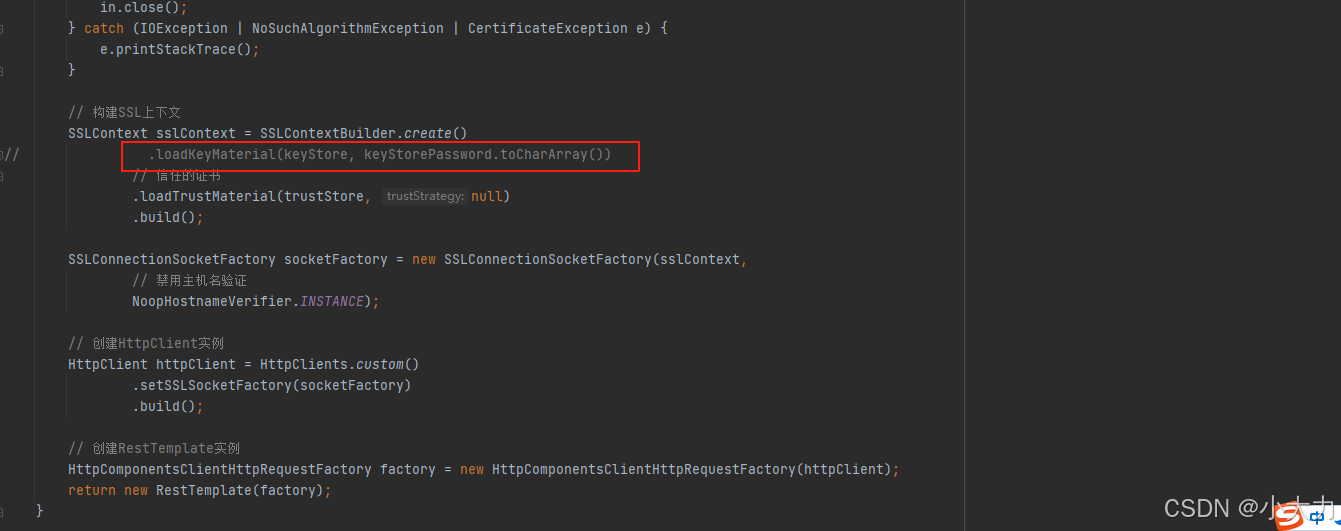简单的 HTTPS 学习
1. 需求
现在使用的服务是HTTP调用形式,服务可能会有调用外围https形式的服务,简单了解了一下,然后写了一个简单的例子进行记录。
HTTP(超文本传输协议) 是一种用于传输超文本的应用层协议,建立在TCP/IP协议栈之上。它定义了客户端(如浏览器)如何向服务器请求资源,以及服务器如何响应这些请求。
HTTPS(超文本传输安全协议) 是HTTP协议的安全版本,它在HTTP与TCP之间加入了SSL/TLS加密层,通过加密数据传输来保障数据的安全性和完整性。
他们的主要区别如下所示:
-
安全性
HTTP协议不加密传输的数据,任何人都可以轻易地获取和篡改传输的内容,存在严重的安全风险。
为了解决HTTP协议的安全问题,HTTPS应运而生。
HTTPS协议通过SSL/TLS加密传输的数据,即使数据被拦截,攻击者也无法解密,有效地保障了数据的安全。
-
数据传输方式
HTTP使用的是不安全的TCP端口80进行数据传输,而HTTPS使用的是更安全的TCP端口443,并通过 SSL/TLS 协议对数据进行加密后再传输,进一步提升了数据传输的安全性。
-
部署成本
HTTP协议是免费的,不需要额外的证书。
而HTTPS协议需要SSL/TLS证书,这些证书通常需要从受信任的证书颁发机构(CA)购买。
-
性能
由于需要进行加密和解密操作,HTTPS协议可能会略微影响网站的加载速度。
但是,随着现代硬件和优化加密算法的应用,这种影响已经被大大降低。
2. 准备
测试环境,我们使用JDK自带的工具生成测试证书,我们此次的调用形式使用RestTemplate进行调用,调用形式分为以下情况
- http 服务调用 https 服务 (服务端验证)
- https 服务调用 https 服务(客户端 服务端双向验证)
2.1 准备证书秘钥信息
我们本地使用 keytool 工具生成,我本地工具类位置如下C:\Program Files\Java\jdk1.8.0_131\bin:
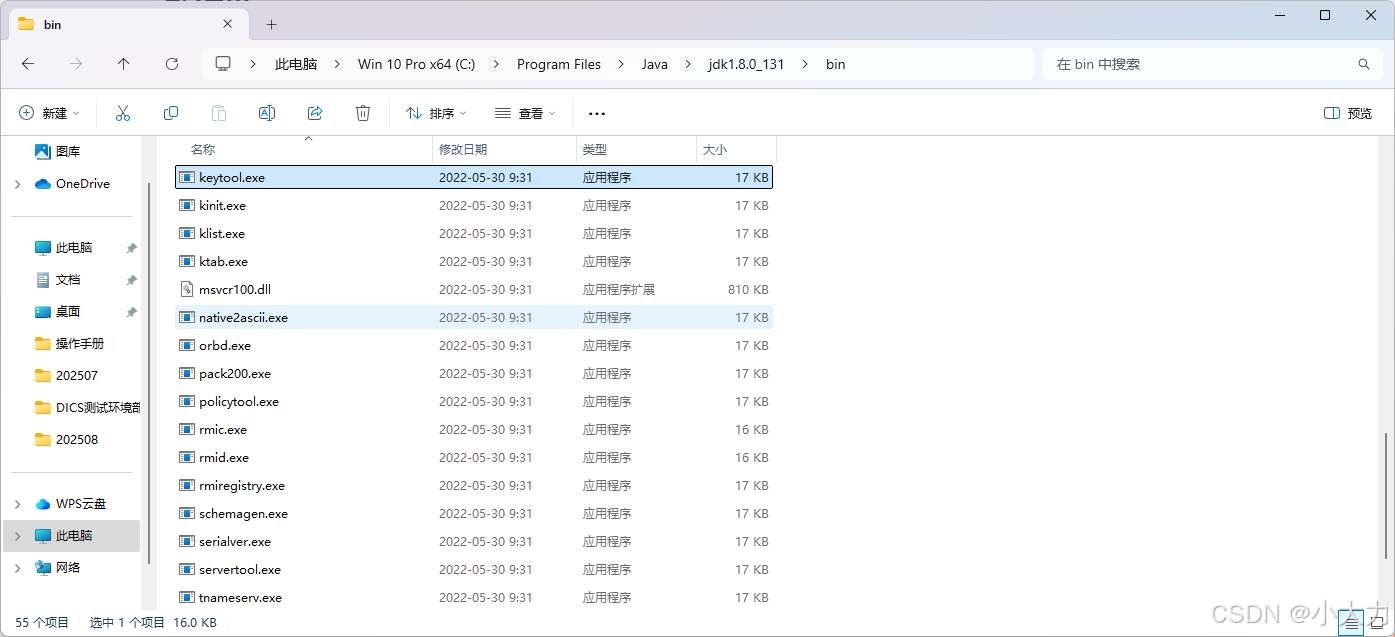
然后需要使用PowerShell 工具进入到keytool目录中,执行命令生成两份证书信息,对应两个https服务使用,我们要输入秘钥口令,以及其他基础信息
shell
# 参数含义如下:
# keytool: 表示keytool工具
# genkey: 表示要创建一个新的密钥。
# alias: 表示 keystore 的别名。anyname 都可以。
# storetype: 表示密钥的仓库类型,存储格式是PKCS12.
# keyalg: 表示使用的加密算法是 RSA ,一种非对称加密算法。
# keysize: 表示密钥的长度。这里是2048.
# keystore: 表示生成的证书文件存放位置。 这里是D:\httpsSecurityKey.p12
# validity: 表示证书的有效时间365天。
keytool -genkey -alias httpsSecurity -storetype PKCS12 -keyalg RSA -keysize 2048 -keystore D:\https_security_key\httpsSecurityKey.p12 -validity 365
keytool -genkey -alias httpsSecuritySecond -storetype PKCS12 -keyalg RSA -keysize 2048 -keystore D:\https_security_key\httpsSecuritySecondKey.p12 -validity 365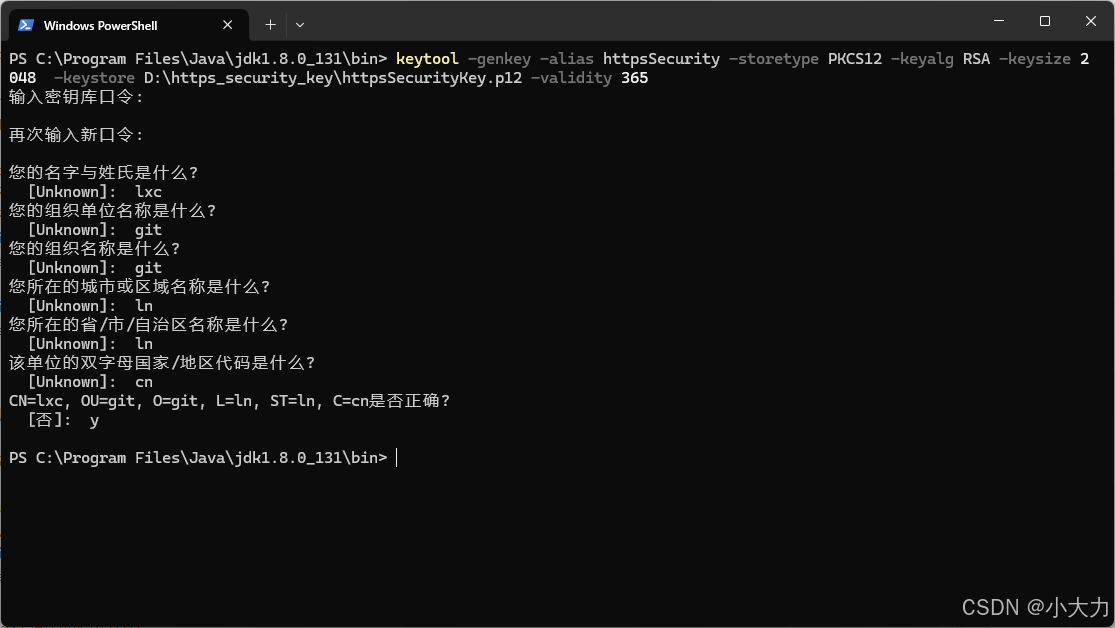
然后执行命令生成两份公钥文件
shell
# 从密钥库中提取公钥证书到独立的证书文件
# 从 httpsSecurityKey.p12 中导出证书部分
# 生成 httpsSecurity.cer 证书文件(只包含公钥和身份信息,不含私钥)
# 这个证书文件可以安全地分发给其他方
keytool -export -alias httpsSecurity -keystore D:\https_security_key\httpsSecurityKey.p12 -storetype PKCS12 -file D:\https_security_key\httpsSecurity.cer
# 将证书添加到信任库中,表示信任该证书持有者
# 创建或更新 truststore.jks 信任库文件
# 将 httpsSecurity.cer 证书导入信任库
# 设置该证书为"受信任的",用于验证对方身份
keytool -import -alias httpsSecurity -file D:\https_security_key\httpsSecurity.cer -keystore D:\https_security_key\truststore.jks
# 从密钥库中提取公钥证书到独立的证书文件...
keytool -export -alias httpsSecuritySecond -keystore D:\https_security_key\httpsSecuritySecondKey.p12 -storetype PKCS12 -file D:\https_security_key\httpsSecuritySecond.cer
# 将证书添加到信任库中,表示信任该证书持有者...
keytool -import -alias httpsSecuritySecond -file D:\https_security_key\httpsSecuritySecond.cer -keystore D:\https_security_key\truststoreSecond.jks最终执行完毕后,会在目录中看到这些文件
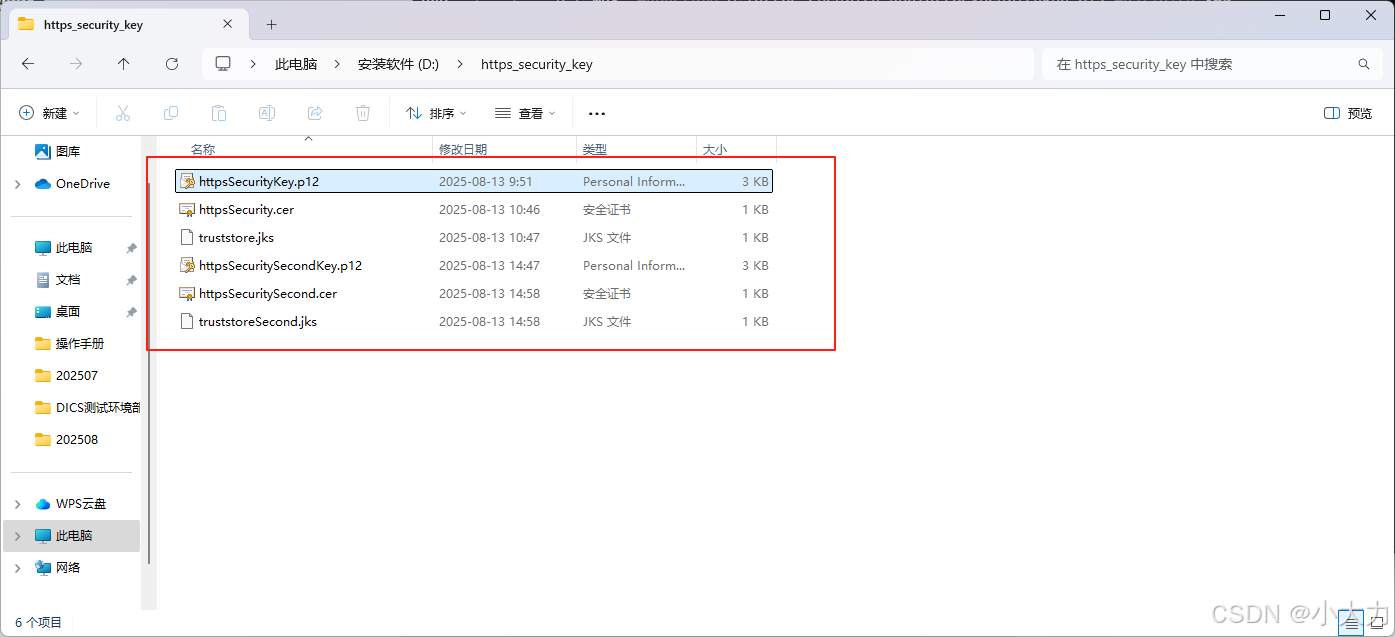
2.2 编写代码
此次测试我们用到了三个服务,分别为http-server,https-server以及 https-server-second,整体的项目结构如下:
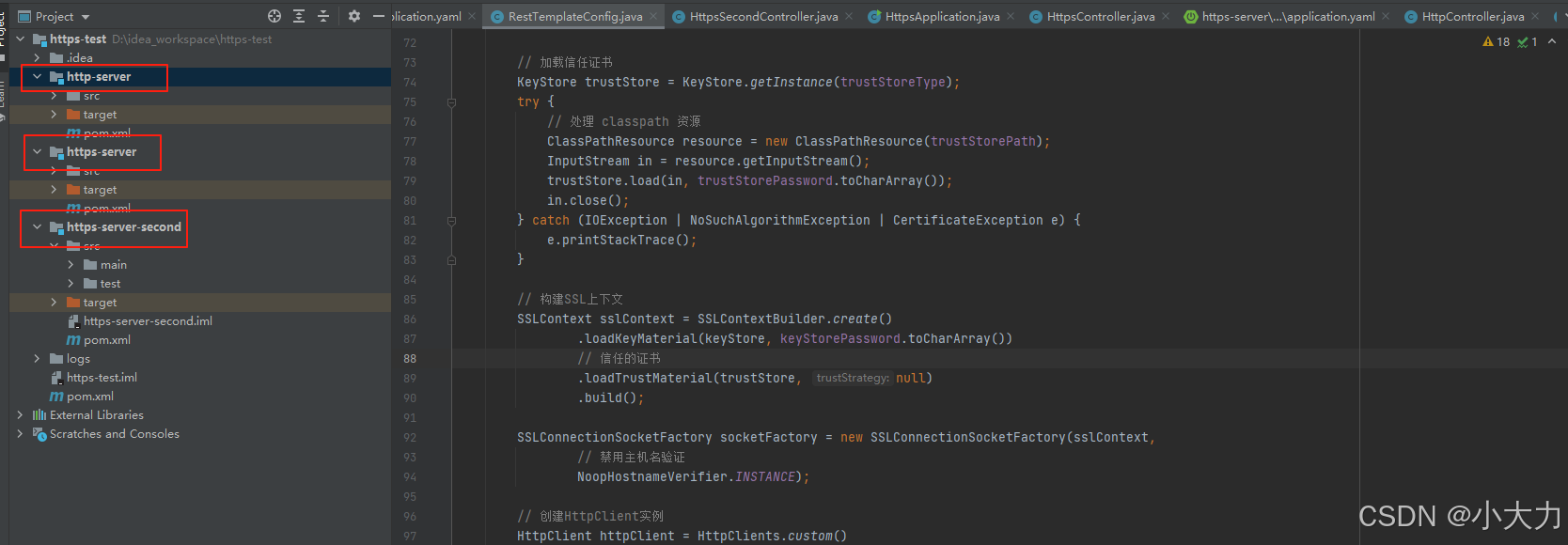
2.2.1 引入pom
服务引入pom分为根pom,服务pom,具体内容如下所示
-
服务根pom
xml<?xml version="1.0" encoding="UTF-8"?> <project xmlns="http://maven.apache.org/POM/4.0.0" xmlns:xsi="http://www.w3.org/2001/XMLSchema-instance" xsi:schemaLocation="http://maven.apache.org/POM/4.0.0 http://maven.apache.org/xsd/maven-4.0.0.xsd"> <modelVersion>4.0.0</modelVersion> <groupId>cn.git</groupId> <artifactId>https-test</artifactId> <version>1.0-SNAPSHOT</version> <modules> <module>http-server</module> <module>https-server</module> <module>https-server-second</module> </modules> <packaging>pom</packaging> <properties> <!-- 如果项目部署要给其他人使用,则此值必须填写为true,否则父级pom不上传,会引起子jar包无法下载情况 --> <maven.deploy.skip>false</maven.deploy.skip> <project.build.sourceEncoding>UTF-8</project.build.sourceEncoding> <project.reporting.outputEncoding>UTF-8</project.reporting.outputEncoding> <java.version>1.8</java.version> <mybatis-plus.version>3.3.0</mybatis-plus.version> <fastjson.version>1.2.83</fastjson.version> <druid.version>1.2.4</druid.version> <oracle.version>11.2.0.4.0-atlassian-hosted</oracle.version> <hutool.version>5.5.7</hutool.version> <lombok.version>1.18.6</lombok.version> <mapstruct.version>1.4.1.Final</mapstruct.version> <swagger.version>3.0.0</swagger.version> <elasticjob.version>3.0.0-RC1</elasticjob.version> <poi-tl.version>1.9.1</poi-tl.version> <poi.version>4.1.2</poi.version> <easyexcel.version>2.2.8</easyexcel.version> <tomcat.version>9.0.44</tomcat.version> </properties> <!-- springboot dependency --> <parent> <groupId>org.springframework.boot</groupId> <artifactId>spring-boot-starter-parent</artifactId> <version>2.3.8.RELEASE</version> <relativePath/> </parent> <!-- 部署到私库 --> <distributionManagement> <repository> <id>git</id> <name>git-releases</name> <url>http://3.1.101.57:8081/repository/maven-releases/</url> </repository> <snapshotRepository> <id>git</id> <name>git-snapshot</name> <url>http://3.1.101.57:8081/repository/maven-snapshots/</url> </snapshotRepository> </distributionManagement> <dependencyManagement> <dependencies> <!-- fastjson --> <dependency> <groupId>com.alibaba</groupId> <artifactId>fastjson</artifactId> <version>${fastjson.version}</version> </dependency> <!-- hutool --> <dependency> <groupId>cn.hutool</groupId> <artifactId>hutool-all</artifactId> <version>${hutool.version}</version> </dependency> <!-- lombok --> <dependency> <groupId>org.projectlombok</groupId> <artifactId>lombok</artifactId> <version>${lombok.version}</version> </dependency> <!-- mapstruct --> <dependency> <groupId>org.mapstruct</groupId> <artifactId>mapstruct</artifactId> <version>${mapstruct.version}</version> </dependency> <!-- swagger --> <dependency> <groupId>io.springfox</groupId> <artifactId>springfox-boot-starter</artifactId> <version>${swagger.version}</version> </dependency> <!-- poi --> <dependency> <groupId>com.deepoove</groupId> <artifactId>poi-tl</artifactId> <version>${poi-tl.version}</version> </dependency> <dependency> <groupId>org.apache.poi</groupId> <artifactId>poi</artifactId> <version>${poi.version}</version> </dependency> <dependency> <groupId>org.apache.poi</groupId> <artifactId>poi-ooxml</artifactId> <version>${poi.version}</version> </dependency> <!-- easyexcel --> <dependency> <groupId>com.alibaba</groupId> <artifactId>easyexcel</artifactId> <version>${easyexcel.version}</version> </dependency> </dependencies> </dependencyManagement> <dependencies> <dependency> <groupId>org.projectlombok</groupId> <artifactId>lombok</artifactId> </dependency> <dependency> <groupId>cn.hutool</groupId> <artifactId>hutool-all</artifactId> </dependency> <dependency> <groupId>com.alibaba</groupId> <artifactId>fastjson</artifactId> <version>${fastjson.version}</version> </dependency> </dependencies> </project> -
服务pom
xml<?xml version="1.0" encoding="UTF-8"?> <project xmlns="http://maven.apache.org/POM/4.0.0" xmlns:xsi="http://www.w3.org/2001/XMLSchema-instance" xsi:schemaLocation="http://maven.apache.org/POM/4.0.0 http://maven.apache.org/xsd/maven-4.0.0.xsd"> <parent> <artifactId>https-test</artifactId> <groupId>cn.git</groupId> <version>1.0-SNAPSHOT</version> </parent> <modelVersion>4.0.0</modelVersion> <artifactId>https-server-second</artifactId> <properties> <maven.compiler.source>8</maven.compiler.source> <maven.compiler.target>8</maven.compiler.target> </properties> <dependencies> <dependency> <groupId>org.springframework.boot</groupId> <artifactId>spring-boot-starter-aop</artifactId> <exclusions> <exclusion> <groupId>org.springframework.boot</groupId> <artifactId>spring-boot-starter-logging</artifactId> </exclusion> </exclusions> </dependency> <dependency> <groupId>org.projectlombok</groupId> <artifactId>lombok</artifactId> <version>1.18.6</version> </dependency> <dependency> <groupId>cn.hutool</groupId> <artifactId>hutool-all</artifactId> <version>5.5.7</version> </dependency> <dependency> <groupId>org.mapstruct</groupId> <artifactId>mapstruct</artifactId> <version>1.4.1.Final</version> </dependency> <dependency> <groupId>com.alibaba</groupId> <artifactId>fastjson</artifactId> <version>1.2.83</version> </dependency> <dependency> <groupId>org.springframework.boot</groupId> <artifactId>spring-boot-starter-web</artifactId> <exclusions> <exclusion> <groupId>org.springframework.boot</groupId> <artifactId>spring-boot-starter-logging</artifactId> </exclusion> </exclusions> </dependency> <dependency> <groupId>org.springframework.boot</groupId> <artifactId>spring-boot-starter-log4j2</artifactId> </dependency> <dependency> <groupId>com.lmax</groupId> <artifactId>disruptor</artifactId> <version>3.3.4</version> </dependency> <dependency> <groupId>org.springframework.boot</groupId> <artifactId>spring-boot-starter-test</artifactId> <scope>test</scope> </dependency> <dependency> <groupId>org.springframework.boot</groupId> <artifactId>spring-boot-autoconfigure</artifactId> </dependency> <dependency> <groupId>org.apache.httpcomponents</groupId> <artifactId>httpclient</artifactId> <version>4.5.14</version> </dependency> </dependencies> <build> <plugins> <!-- compiler --> <plugin> <groupId>org.apache.maven.plugins</groupId> <artifactId>maven-compiler-plugin</artifactId> <version>3.8.1</version> <configuration> <source>1.8</source> <target>1.8</target> <annotationProcessorPaths> <path> <groupId>org.mapstruct</groupId> <artifactId>mapstruct-processor</artifactId> <version>1.4.1.Final</version> </path> <path> <groupId>org.projectlombok</groupId> <artifactId>lombok</artifactId> <version>${lombok.version}</version> </path> </annotationProcessorPaths> </configuration> </plugin> <!-- package --> <plugin> <groupId>org.springframework.boot</groupId> <artifactId>spring-boot-maven-plugin</artifactId> </plugin> <!-- maven私服jar包部署插件 --> <plugin> <groupId>org.apache.maven.plugins</groupId> <artifactId>maven-deploy-plugin</artifactId> <version>${maven-deploy-plugin.version}</version> <configuration> <skip>false</skip> </configuration> </plugin> </plugins> </build> </project>
2.2.2 http-server服务
RestTemplate配置部分代码
java
package cn.git.http.config;
import org.apache.http.client.HttpClient;
import org.apache.http.conn.ssl.NoopHostnameVerifier;
import org.apache.http.conn.ssl.SSLConnectionSocketFactory;
import org.apache.http.impl.client.HttpClients;
import org.apache.http.ssl.SSLContextBuilder;
import org.springframework.beans.factory.annotation.Value;
import org.springframework.context.annotation.Bean;
import org.springframework.context.annotation.Configuration;
import org.springframework.core.io.ClassPathResource;
import org.springframework.http.client.HttpComponentsClientHttpRequestFactory;
import org.springframework.web.client.RestTemplate;
import javax.net.ssl.SSLContext;
import java.io.FileInputStream;
import java.io.IOException;
import java.io.InputStream;
import java.security.*;
import java.security.cert.CertificateException;
/**
* @description: RestTemplate 配置类
* @program: bank-credit-sy
* @author: lixuchun
* @create: 2025-08-13
*/
@Configuration
public class RestTemplateConfig {
@Value("${client.ssl.trust-store}")
private String trustStorePath;
@Value("${client.ssl.trust-store-password}")
private String trustStorePassword;
@Value("${client.ssl.trust-store-type}")
private String trustStoreType;
/**
* 创建RestTemplate实例
*
* @return
* @throws KeyStoreException
* @throws NoSuchAlgorithmException
* @throws KeyManagementException
*/
@Bean
public RestTemplate restTemplate() throws KeyStoreException, NoSuchAlgorithmException, KeyManagementException {
// 加载https服务提供的公钥信息
KeyStore trustStore = KeyStore.getInstance(trustStoreType);
try {
// 处理 classpath 资源
ClassPathResource resource = new ClassPathResource(trustStorePath);
InputStream in = resource.getInputStream();
trustStore.load(in, trustStorePassword.toCharArray());
in.close();
} catch (IOException | NoSuchAlgorithmException | CertificateException e) {
e.printStackTrace();
}
// 构建SSL上下文
SSLContext sslContext = SSLContextBuilder.create()
// 信任的证书
.loadTrustMaterial(trustStore, null)
.build();
SSLConnectionSocketFactory socketFactory = new SSLConnectionSocketFactory(sslContext,
// 禁用主机名验证
NoopHostnameVerifier.INSTANCE);
HttpClient httpClient = HttpClients.custom()
.setSSLSocketFactory(socketFactory)
.build();
HttpComponentsClientHttpRequestFactory factory =
new HttpComponentsClientHttpRequestFactory(httpClient);
return new RestTemplate(factory);
}
}请求controller代码
java
package cn.git.http.controller;
import lombok.extern.slf4j.Slf4j;
import org.springframework.beans.factory.annotation.Autowired;
import org.springframework.http.HttpEntity;
import org.springframework.http.HttpHeaders;
import org.springframework.http.MediaType;
import org.springframework.web.bind.annotation.GetMapping;
import org.springframework.web.bind.annotation.RequestMapping;
import org.springframework.web.bind.annotation.RestController;
import org.springframework.web.client.RestTemplate;
/**
* @description: httpController测试接口
* @program: bank-credit-sy
* @author: lixuchun
* @create: 2025-08-13
*/
@Slf4j
@RestController
@RequestMapping("/http")
public class HttpController {
@Autowired
private RestTemplate restTemplate;
@GetMapping("/getHttpInfo")
public String getHttpInfo() {
log.info("getHttpInfo");
return "http";
}
/**
* GET获取https服务信息
*
* @return
*/
@GetMapping("/getHttpsInfo")
public String getHttpsInfo() {
return restTemplate.getForObject("https://3.2.36.116:443/https/getHttpsInfo", String.class);
}
/**
* POST获取https服务信息
*
* @return
*/
@GetMapping("/getPostHttpsInfo")
public String getPostHttpsInfo() {
String requestBody = "{\"id\":\"1\",\"name\": \"jack\"}";
// 创建请求头,设置Content-Type为JSON
HttpHeaders headers = new HttpHeaders();
headers.setContentType(MediaType.APPLICATION_JSON);
// 创建HttpEntity
HttpEntity<String> requestEntity = new HttpEntity<>(requestBody, headers);
// POST请求,调用https服务
return restTemplate.postForObject("https://3.2.36.116:443/https/getPostHttpsInfo", requestEntity, String.class);
}
}application.yaml配置文件内容
yaml
spring:
application:
name: @project.artifactId@
main:
allow-bean-definition-overriding: true
server:
port: 80
# https-server 客户端公钥密码配置
client:
ssl:
# 服务端提供信任库文件
trust-store: truststore.jks
trust-store-type: JKS
# 信任库文件密码
trust-store-password: 888666li并且我们需要将生成的信任库文件放入到 resoures 目录之中

2.2.3 https-server服务
controller测试接口文件
java
package cn.git.https.controller;
import cn.git.https.vo.HttpsInVO;
import com.alibaba.fastjson.JSONObject;
import org.springframework.web.bind.annotation.*;
/**
* @description: httpController测试接口
* @program: bank-credit-sy
* @author: lixuchun
* @create: 2025-08-13
*/
@RestController
@RequestMapping("/https")
public class HttpsController {
@GetMapping("/getHttpsInfo")
public String getHttpInfo() {
return "https";
}
@PostMapping("/getPostHttpsInfo")
public String getPostHttpInfo(@RequestBody HttpsInVO httpsInVO) {
return JSONObject.toJSONString(httpsInVO);
}
}POST形式调用参数inVO文件
java
package cn.git.https.vo;
import lombok.AllArgsConstructor;
import lombok.Data;
import lombok.NoArgsConstructor;
/**
* @description: 传入inVO
* @program: bank-credit-sy
* @author: lixuchun
* @create: 2025-08-13
*/
@Data
@NoArgsConstructor
@AllArgsConstructor
public class HttpsInVO {
private String id;
private String name;
}application.yaml 服务配置文件
yaml
spring:
application:
name: @project.artifactId@
main:
allow-bean-definition-overriding: true
server:
port: 443
ssl:
# 服务器端HTTPS证书
key-store: classpath:httpsSecurityKey.p12
# 服务器端HTTPS证书密码
key-store-password: 666888li
# 服务器端HTTPS证书别名
key-alias: httpsSecurity
# 服务器端HTTPS证书类型,默认JKS
key-store-type: PKCS12
# 新增的双向认证配置
# 信任库(包含客户端公钥证书)
trust-store: classpath:truststoreSecond.jks
# 信任库密码
trust-store-password: 888666secondli
# 要求客户端认证 : want-不强制希望,need-强制,none-不认证
client-auth: need注意,我们需要将生成的服务证书以及另一个https服务提供的信任库文件放到resources目录中
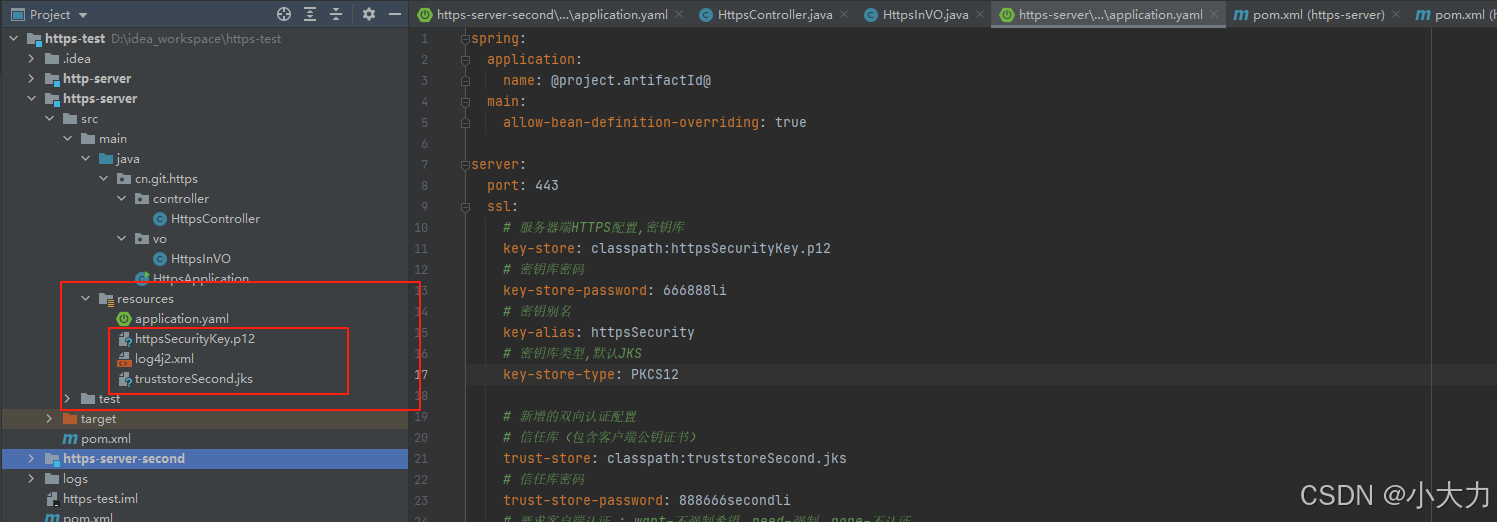
2.2.4 https-server-second服务
RestTemplate配置,此为双向验证,所以与http-server的restTemplate配置略有不同
java
package cn.git.https.config;
import cn.hutool.core.util.StrUtil;
import org.apache.http.client.HttpClient;
import org.apache.http.conn.ssl.NoopHostnameVerifier;
import org.apache.http.conn.ssl.SSLConnectionSocketFactory;
import org.apache.http.impl.client.HttpClients;
import org.apache.http.ssl.SSLContextBuilder;
import org.springframework.beans.factory.annotation.Value;
import org.springframework.context.annotation.Bean;
import org.springframework.context.annotation.Configuration;
import org.springframework.core.io.ClassPathResource;
import org.springframework.http.client.HttpComponentsClientHttpRequestFactory;
import org.springframework.web.client.RestTemplate;
import javax.net.ssl.SSLContext;
import java.io.FileInputStream;
import java.io.FileNotFoundException;
import java.io.IOException;
import java.io.InputStream;
import java.security.*;
import java.security.cert.CertificateException;
/**
* @description: RestTemplate 配置类
* @program: bank-credit-sy
* @author: lixuchun
* @create: 2025-08-13
*/
@Configuration
public class RestTemplateConfig {
@Value("${client.ssl.trust-store}")
private String trustStorePath;
@Value("${client.ssl.trust-store-password}")
private String trustStorePassword;
@Value("${client.ssl.trust-store-type}")
private String trustStoreType;
@Value("${server.ssl.key-store}")
private String keyStorePath;
@Value("${server.ssl.key-store-password}")
private String keyStorePassword;
@Value("${server.ssl.key-store-type}")
private String keyStoreType;
/**
* 创建RestTemplate实例
*
* @return
* @throws KeyStoreException
* @throws NoSuchAlgorithmException
* @throws KeyManagementException
*/
@Bean
public RestTemplate restTemplate() throws KeyStoreException, NoSuchAlgorithmException, KeyManagementException, UnrecoverableKeyException {
// 加载客户端证书(用于双向认证)
KeyStore keyStore = KeyStore.getInstance(keyStoreType);
try {
// 处理 classpath 资源
ClassPathResource resource = new ClassPathResource(keyStorePath.substring(10));
InputStream in = resource.getInputStream();
keyStore.load(in, keyStorePassword.toCharArray());
in.close();
} catch (IOException | NoSuchAlgorithmException | CertificateException e) {
e.printStackTrace();
}
// 加载信任证书
KeyStore trustStore = KeyStore.getInstance(trustStoreType);
try {
// 处理 classpath 资源
ClassPathResource resource = new ClassPathResource(trustStorePath);
InputStream in = resource.getInputStream();
trustStore.load(in, trustStorePassword.toCharArray());
in.close();
} catch (IOException | NoSuchAlgorithmException | CertificateException e) {
e.printStackTrace();
}
// 构建SSL上下文
SSLContext sslContext = SSLContextBuilder.create()
.loadKeyMaterial(keyStore, keyStorePassword.toCharArray())
// 信任的证书
.loadTrustMaterial(trustStore, null)
.build();
SSLConnectionSocketFactory socketFactory = new SSLConnectionSocketFactory(sslContext,
// 禁用主机名验证
NoopHostnameVerifier.INSTANCE);
// 创建HttpClient实例
HttpClient httpClient = HttpClients.custom()
.setSSLSocketFactory(socketFactory)
.build();
// 创建RestTemplate实例
HttpComponentsClientHttpRequestFactory factory = new HttpComponentsClientHttpRequestFactory(httpClient);
return new RestTemplate(factory);
}
}controller测试接口代码
java
package cn.git.https.controller;
import org.springframework.beans.factory.annotation.Autowired;
import org.springframework.http.HttpEntity;
import org.springframework.http.HttpHeaders;
import org.springframework.http.MediaType;
import org.springframework.web.bind.annotation.GetMapping;
import org.springframework.web.bind.annotation.RequestMapping;
import org.springframework.web.bind.annotation.RestController;
import org.springframework.web.client.RestTemplate;
/**
* @description: second-https controller测试接口
* @program: bank-credit-sy
* @author: lixuchun
* @create: 2025-08-13
*/
@RestController
@RequestMapping("/https")
public class HttpsSecondController {
@Autowired
private RestTemplate restTemplate;
@GetMapping("/getLocalHttpsSecondInfo")
public String getHttpInfo() {
return "getHttpsSecondInfo";
}
/**
* GET获取https服务信息
*
* @return
*/
@GetMapping("/getHttpsSecondInfo")
public String getHttpsSecondInfo() {
return restTemplate.getForObject("https://3.2.36.116:443/https/getHttpsInfo", String.class);
}
/**
* POST获取https服务信息
*
* @return
*/
@GetMapping("/getPostHttpsSecondInfo")
public String getPostHttpsInfo() {
String requestBody = "{\"id\":\"1\",\"name\": \"jack\"}";
// 创建请求头,设置Content-Type为JSON
HttpHeaders headers = new HttpHeaders();
headers.setContentType(MediaType.APPLICATION_JSON);
// 创建HttpEntity
HttpEntity<String> requestEntity = new HttpEntity<>(requestBody, headers);
// POST请求,调用https服务
return restTemplate.postForObject("https://3.2.36.116:443/https/getPostHttpsInfo", requestEntity, String.class);
}
}application.yaml配置文件信息
yaml
spring:
application:
name: @project.artifactId@
main:
allow-bean-definition-overriding: true
# 服务器端HTTPS配置
server:
port: 8443
ssl:
# 服务器端HTTPS证书
key-store: classpath:httpsSecuritySecondKey.p12
# 服务器端HTTPS证书密码
key-store-password: 666888secondli
# 服务器端HTTPS证书别名
key-alias: httpsSecuritySecond
# 服务器端HTTPS证书类型
key-store-type: PKCS12
# 新增的双向认证配置
# 信任库(包含客户端公钥证书)
trust-store: classpath:truststore.jks
# 信任库密码
trust-store-password: 888666li
# 要求客户端认证 : want-不强制希望,need-强制,none-不认证
client-auth: none
# https-server 客户端公钥密码配置
client:
ssl:
# 服务端提供信任库文件
trust-store: truststore.jks
# 服务端提供信任库文件类型
trust-store-type: JKS
# 信任库文件密码
trust-store-password: 888666li注意,我们需要将生成的服务证书以及另一个https服务提供的信任库文件放到resources目录中,主要实现双向认证
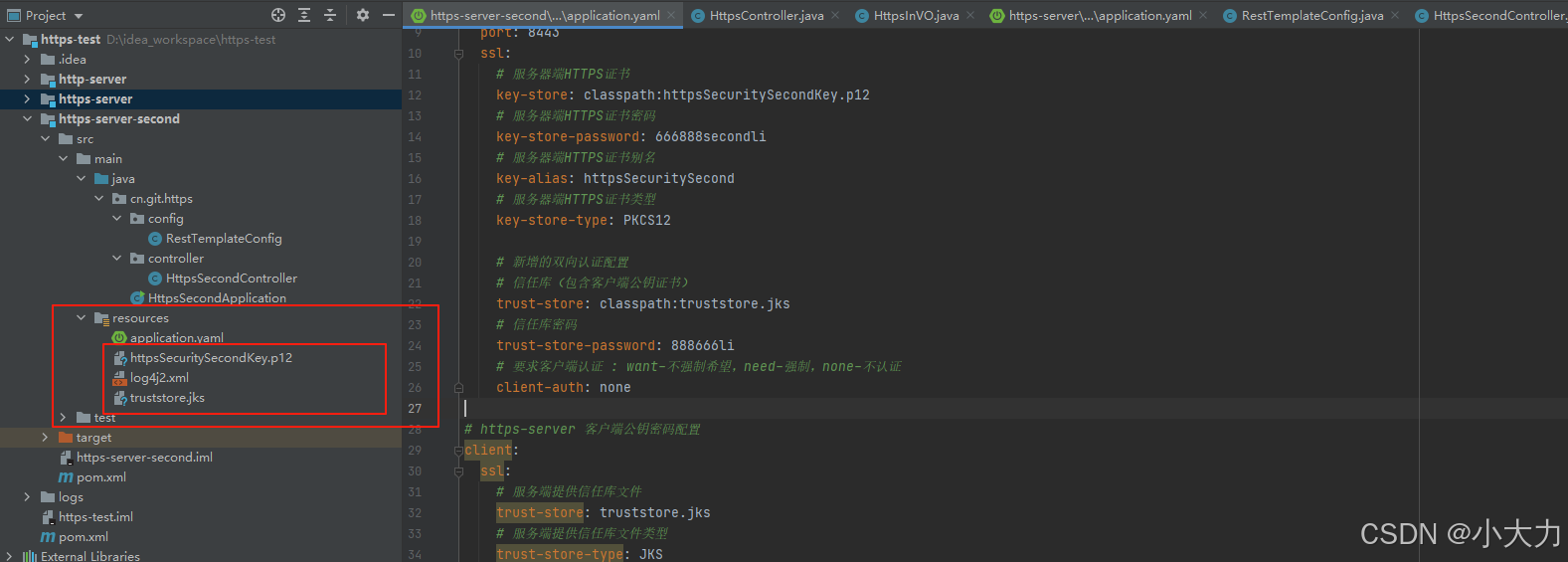
3. 测试
测试主要分为两种测试,第一个http调用https,第二种https调用https(双向验证)
3.1 http调用 https
http调用https形式的时候,我们需要将https-server服务端的 client-auth 客户端验证禁用,否则访问接口提示如下信息,需要配置浏览器证书信息
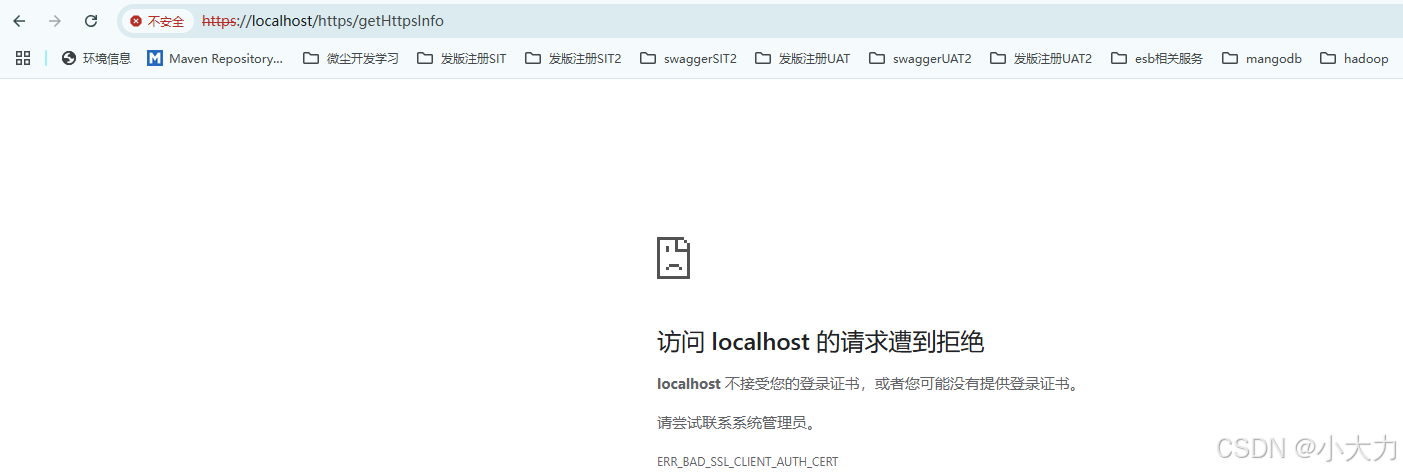
禁用客户端验证,将 client-auth 设置为 none
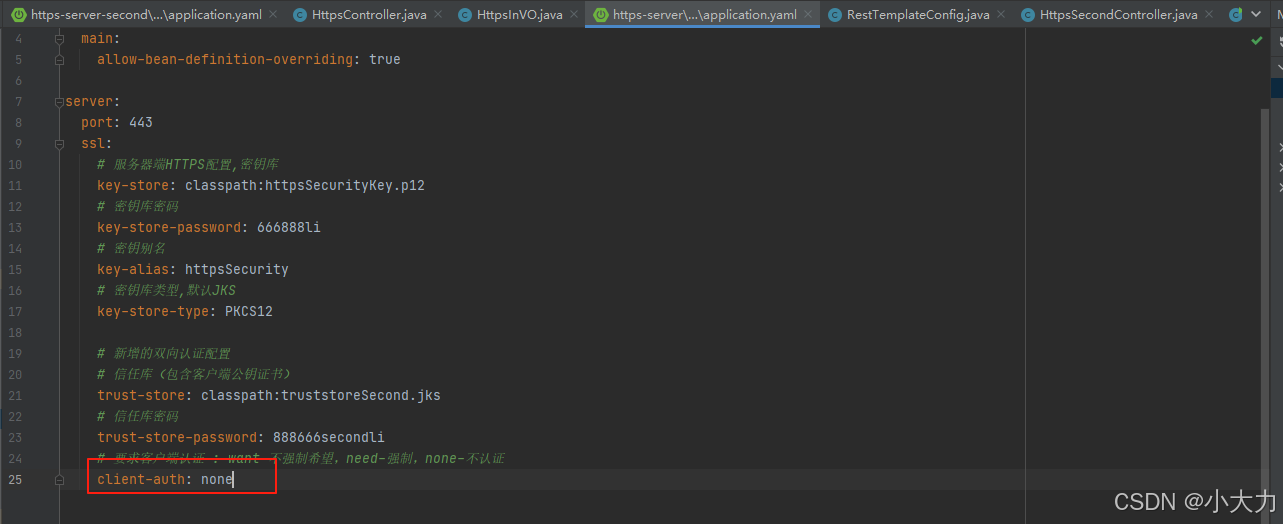
先访问https-server自己服务接口,https://localhost/https/getHttpsInfo,请求结果如下

然后通过http-server接口,restTemplate调用 https-server接口,http://localhost/http/getHttpsInfo 请求结果如下

通过PostMan,访问 https://localhost:443/https/getPostHttpsInfo 进行post请求,请求结果如下
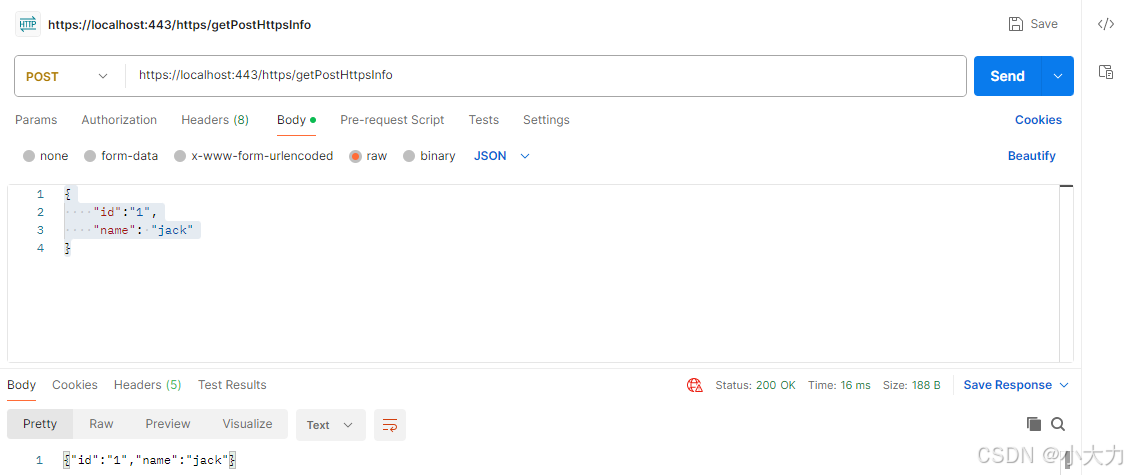
如果禁用 restTemplate配置的SSL证书信任库,然后再发起请求,http://localhost/http/getHttpsInfo 请求结果如下
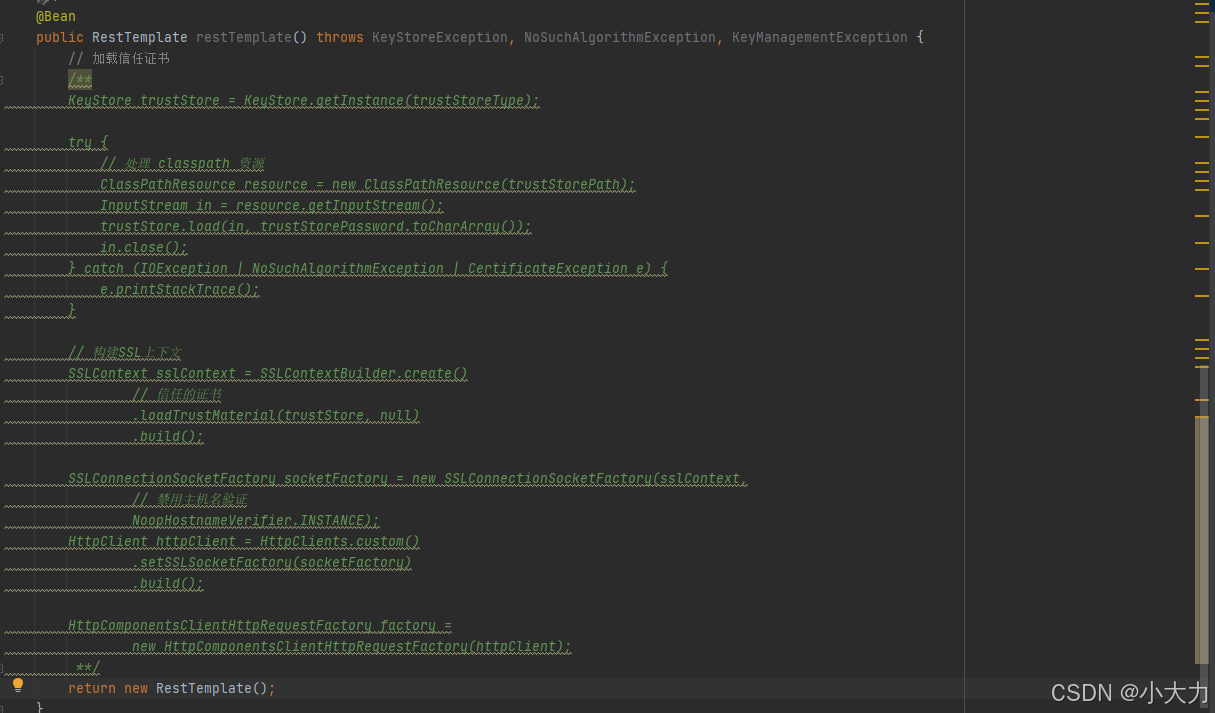


3.2 https调用https
我们首先开启https-server的客户端验证,现在访问需要进行客户端验证了
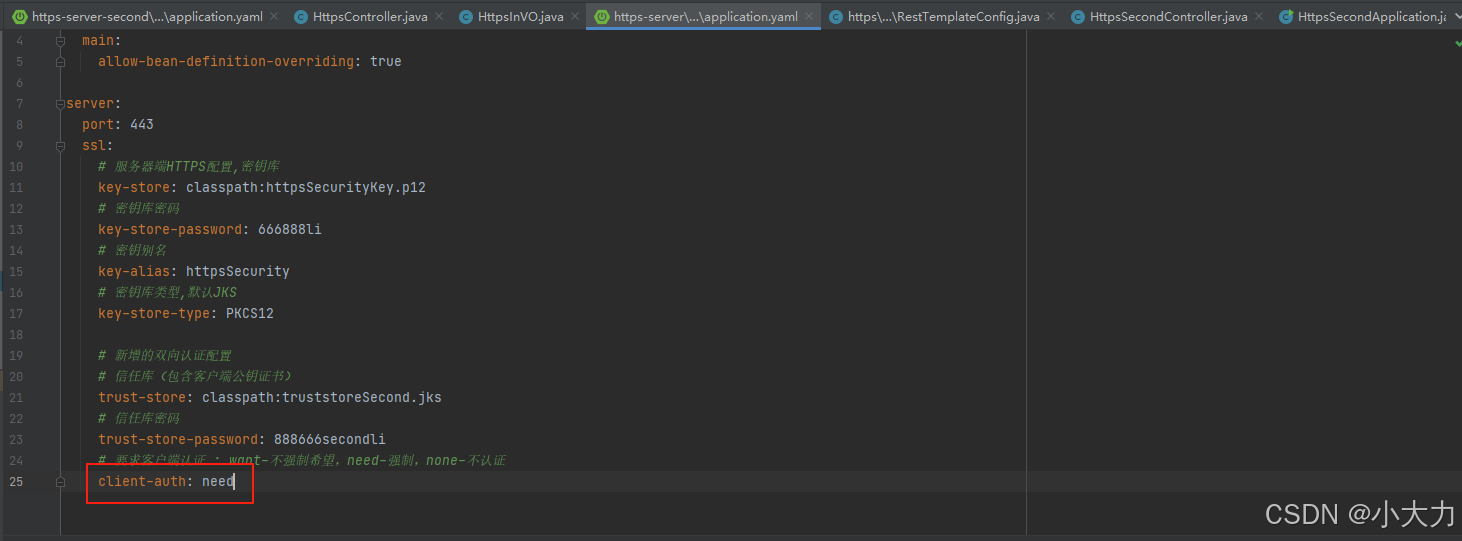
我们访问 https-server-second 接口,里面进行了restTemplate调用 https-server接口 https://localhost:8443/https/getHttpsSecondInfo 展示结果如下

如果我注释https-server-second 配置restTemplate的 加载客户端证书(用于双向认证)配置,再次访问https://localhost:8443/https/getHttpsSecondInfo 展示结果如下
